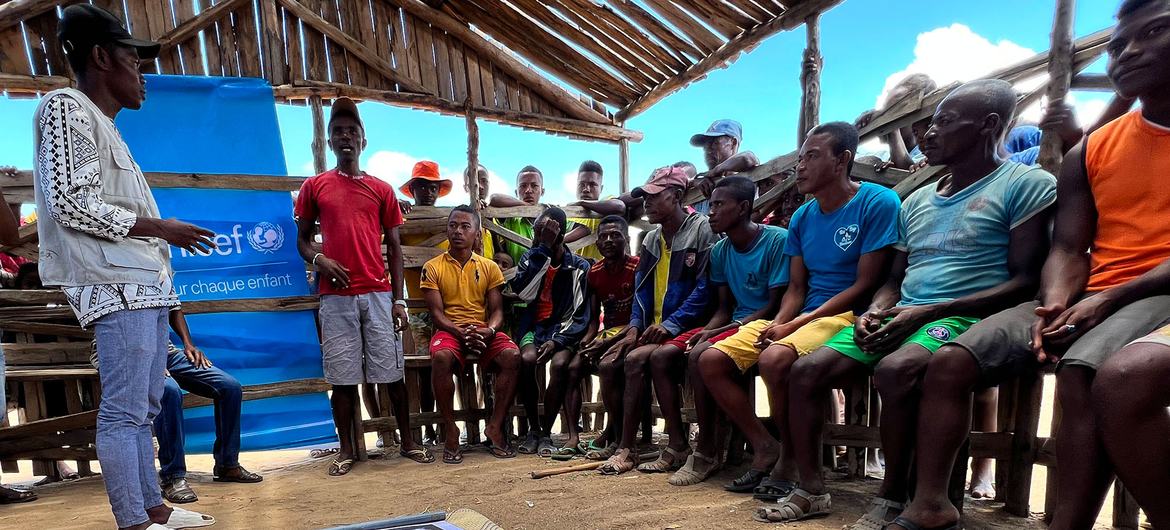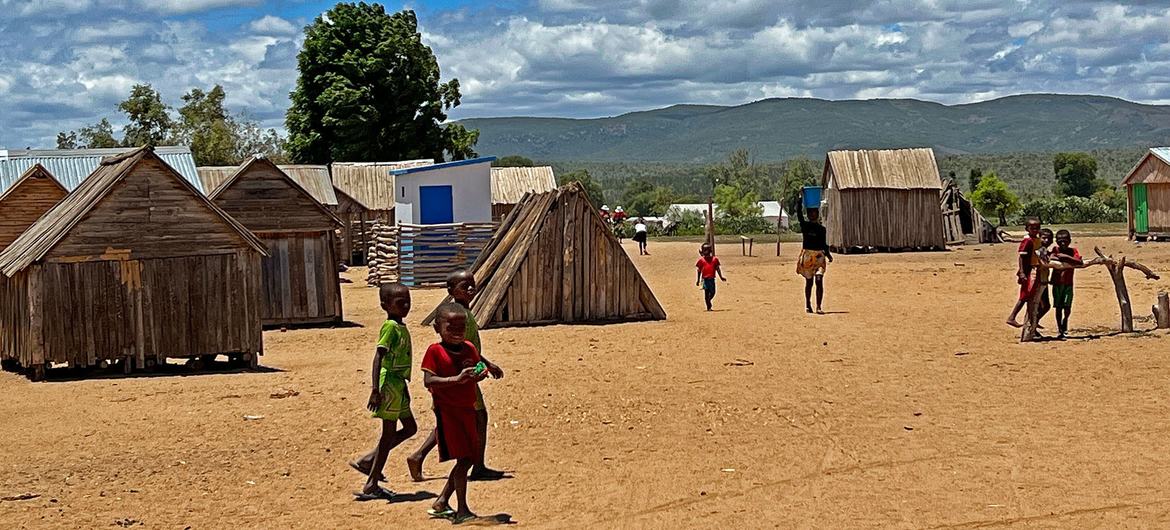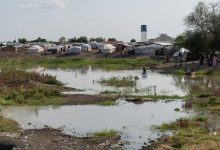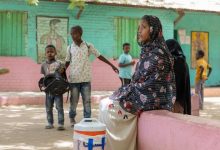“Girls in Southern Madagascar Get Hitched Before They’re Even Out of the Cradle!”
The arranged marriage typically involves the exchange of a highly prized and culturally important Zebu cow for teenage girls as young as 13 years old.
Now two UN agencies UNICEF and the UN Population Fund (UNFPA) are working together with the local authorities to educate women and also men, through sessions focusing on positive masculinity, about the dangers of the practice and how to treat women as equals.
Daniel Dickinson of UN News spoke to Lehilahy Modely, who joined one of the sessions in the village of Ifotaka, in the Amboasary district of the Anosy region of Madagascar.
“I am here today in a small village meeting space with about 30 other men to understand and discuss all the types of violence which are perpetrated against women and girls.
There is a selection of images we have to choose from to describe the different ways men are violent towards women. I have chosen an image which shows the outline of a man about to strike a woman, which has led to a discussion about physical harm. There are also images which depict sexual, psychological and economic violence as well as the maltreatment of children.
One of the biggest challenges I see in my region is the combination of economic violence and the abuse of the rights of girls even before they are born. Families which are normally very poor and vulnerable agree to exchange their unborn girl child for a Zebu cow.
The Zebu is very important in our culture as it is a sign of wealth and respectability. It is often at the centre of many traditions; for example, in certain ethnic groups as a rite of passage, boys are
forced to steal a cow before they can be accepted as a man in the community. A Zebu is normally sacrificed to mark a birth, a circumcision ceremony, a death or a marriage.

UN News/Daniel Dickinson
Men meet once a month to discuss gender issues and how to act in a positive way towards women.
This practice is very common in the south of Madagascar and I have seen many teenage girls, some as young as 13, forced to leave their family and become the wife of an older man. This man may have other wives as well, as polygamy is also practiced here.
Girls who refuse this arrangement are often disowned by their family because of the shame it brings and I have heard some cases of girls committing suicide.
Culture and poverty
The man will often pay the maternity costs for his future child bride as well as supporting the family in other ways up until he receives the girl and presents the Zebu. Families engage in this exchange partly because of tradition but mainly because of poverty.
I am very frustrated to see this and I have a lot of empathy for these girls who have no choice and who are no longer able to carry on living like a child or even go to school.
We have talked about this in our positivity masculinity groups and most men understand that it is they who have to make the change because they are the actors of violence and subversion.
Too many of my friends see women as feeble and fragile, show little respect towards them and are not interested in hearing their views. Those friends consider me weak and joke that I am controlled by women, just because I try to promote their well-being and rights. Even though I disagree, I have remained friends with them.

UN News/Daniel Dickinson
Some of Madagascar’s most vulnerable communities live in the south of the island country.
We meet in this group once a month; the meetings also include information about how to report incidents of violence against children. These cases are referred to Centre Vonjy, an integrated care center for child victims of violence in the town of Fort Dauphin.
I do now see that some men recognize that we should change our attitudes and begin to think of women as having the same rights as we do which I believe will lead to equality.
Change will not come tomorrow, but men must do their best to end this culturally acceptable but illegal practice.”
Nora Chambers, an acclaimed journalist with a focus on global affairs and humanitarian issues, has dedicated over twenty years to reporting from conflict zones worldwide. Her work has spotlighted marginalized communities and highlighted urgent international concerns.




In my opinion, it is crucial to address the deep-rooted cultural beliefs and practices that perpetuate the harmful tradition of selling girls into marriage before they are even born. It is heartening to see initiatives like the ones led by UNICEF and UNFPA in Southern Madagascar to educate both men and women on gender equality and combatting violence against women and girls. Empowering communities with knowledge and awareness is key to breaking the cycle of gender-based violence and discrimination.
I am here today at a small village meeting space with about 30 other men to understand and discuss all the types of violence which are perpetrated against women and girls. There is a selection of images we have to choose from to describe the different ways men are violent towards women. I have chosen an image which shows the outline of a man about to strike a woman, which has led to a discussion about physical harm. There are also images which depict sexual, psychological and economic violence as well as the maltreatment of children. One of the biggest challenges I see in my region is the combination of economic violence and the abuse of the rights of girls even before they are born. Families which are normally very poor and vulnerable agree to exchange their unborn girl child for a Zebu cow. The Zebu is very important in our culture as it is a sign of wealth and respectability. It is often at the centre o
Why is this practice still happening in today’s world? What can be done to effectively stop it?
To effectively stop this harmful practice, it is crucial to continue promoting education and awareness at the grassroots level. By engaging with local communities and empowering both men and women with the knowledge of gender equality and human rights, we can gradually shift cultural norms and eliminate such practices. It requires a concerted effort from various stakeholders, including governmental bodies, NGOs, and community leaders. Change may not happen overnight, but with persistence and collaboration, we can create a safer and more equitable society for all.
The practice of arranging marriages for young girls as a commodity is deeply concerning. It’s crucial to educate both women and men about gender equality and to eradicate harmful practices like these. I’m glad to see initiatives working towards change in Madagascar.
Are there any specific strategies being implemented to empower these young girls in Madagascar and ensure their rights are protected?
Yes, EmilySmith, the UN agencies UNICEF and the UN Population Fund (UNFPA) are conducting sessions in Southern Madagascar to educate both women and men on the dangers of early arranged marriages and how to promote gender equality. These initiatives aim to empower young girls and protect their rights.
As a woman, it’s heartbreaking to hear about these young girls being forced into marriages at such a tender age. We must continue to raise awareness and empower these girls to have a voice and a choice in their own futures.
Why are teenage girls as young as 13 years old being exchanged for a Zebu cow in Southern Madagascar?
Teenage girls as young as 13 years old are exchanged for a Zebu cow in Southern Madagascar due to cultural traditions deeply rooted in the region. It is a harmful practice that perpetuates inequality and objectifies women. Organizations like UNICEF and UNFPA are working to educate communities and eradicate this harmful custom.
How can such a harmful tradition still persist in this day and age? What more can be done to protect these young girls from such practices?
As a woman, I find it appalling that young girls are forced into marriage at such a young age. It is crucial that we work towards educating both men and women on the importance of gender equality and ending harmful practices like this. No girl should be treated as a commodity to be exchanged for a cow.
Do the UN agencies provide any support or resources for these young girls who are forced into such marriages? How are they helping to protect their rights and ensure their well-being?
As a mother of two daughters, it breaks my heart to read about these young girls being subjected to arranged marriages at such a tender age. It’s crucial that we continue to raise awareness and educate both women and men on the importance of gender equality and women’s rights. No girl should ever be traded for a cow, no matter how culturally significant it may be.